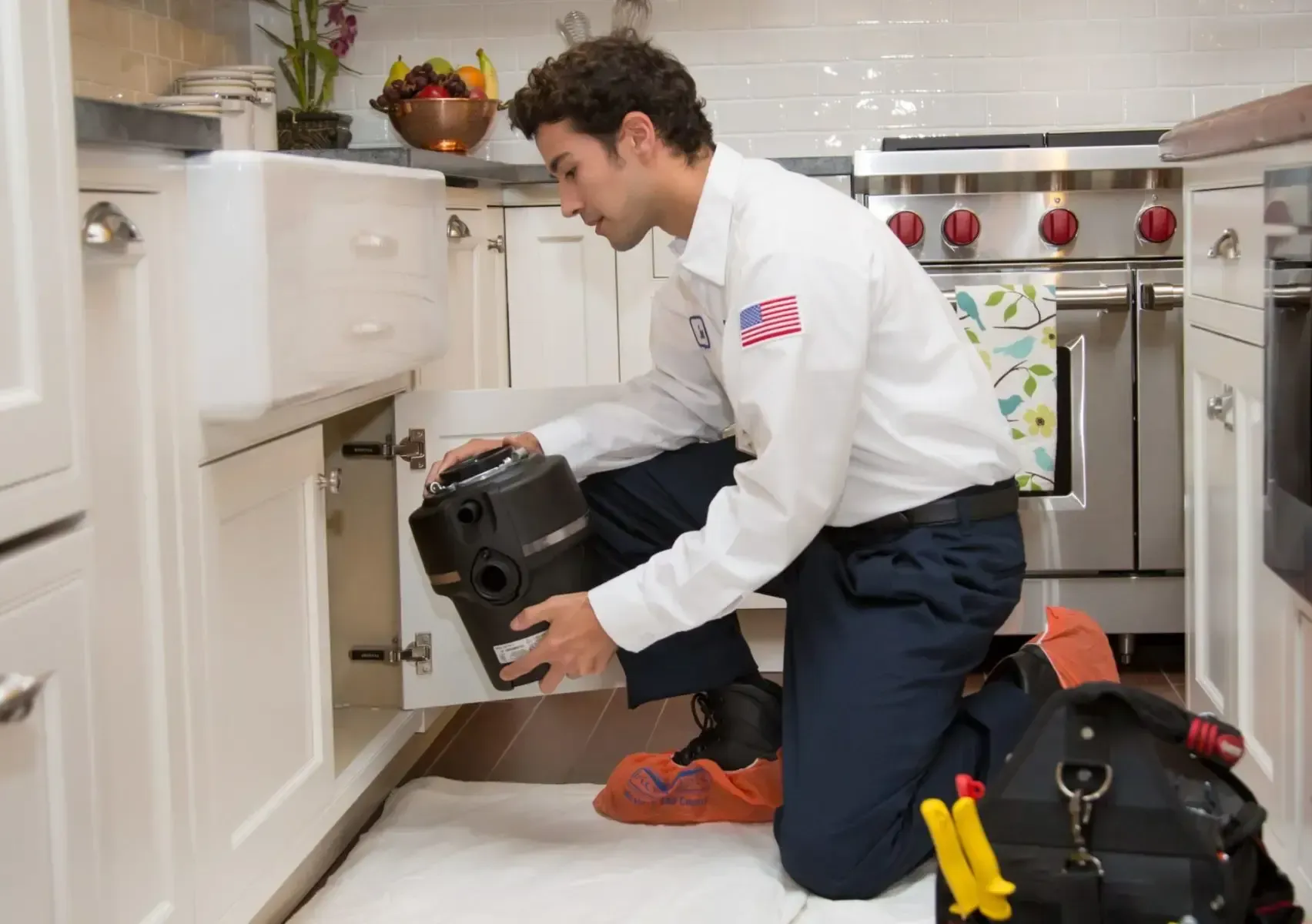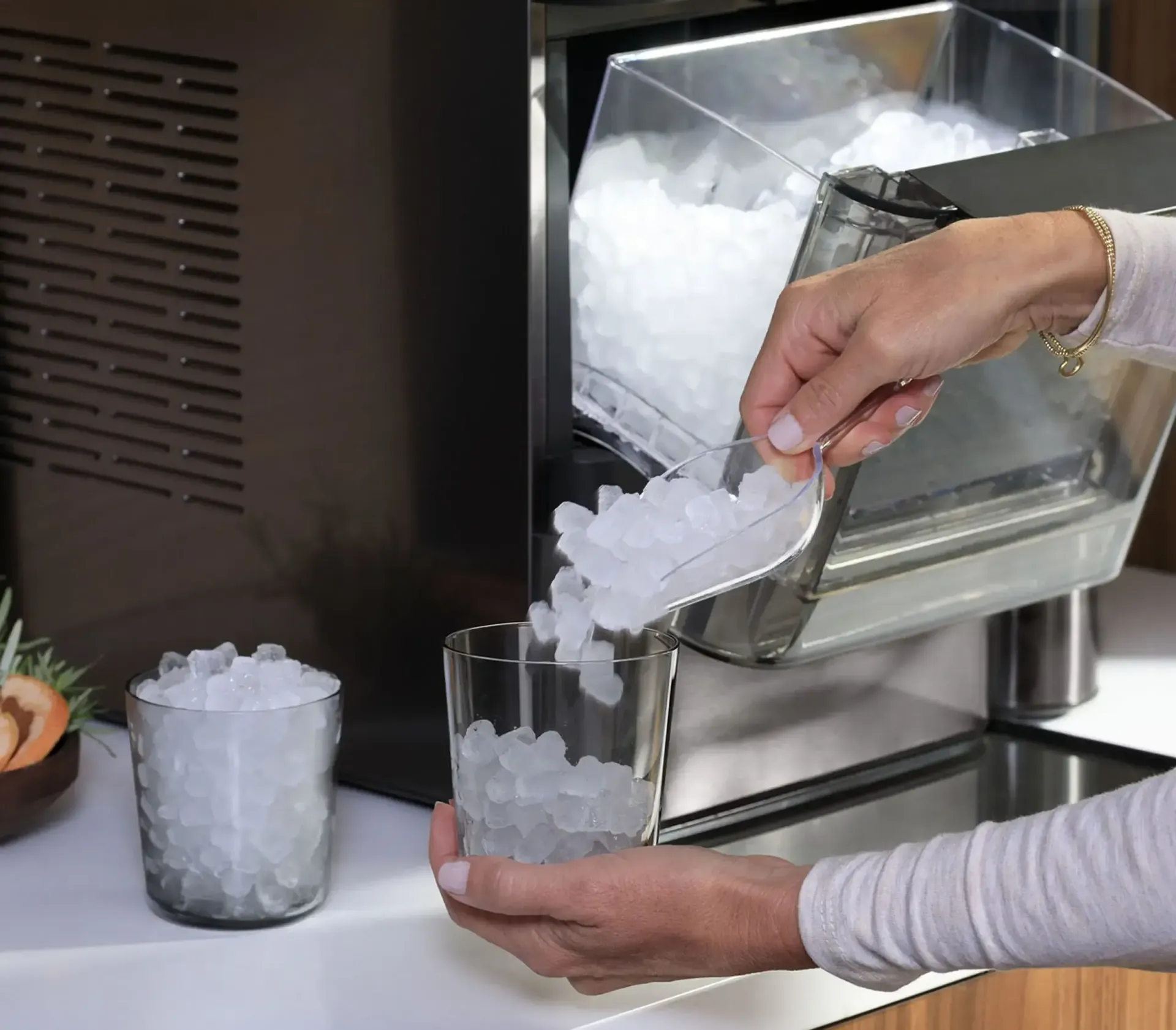Question 1
Why is there an ice or water dispensing problem?
Answer: The ice and water dispenser system for refrigerators is very complicated. There are many components working together that provide your ice and water. Make sure the household water is turned on to the ice maker, and make sure that there are no kinks in the water line. Next, inspect the feeler arm of the ice maker and make sure that it is down and not blocked by any ice cubes. If it’s raised, it has turned the ice maker off. This arm needs to be in the lowered position to activate the ice maker Too much ice in the bin will make the arm stay up as a safety feature to keep the ice maker from making more ice than the bin can hold.
The water filter may be plugged with sediment, or you may have low water pressure. The water pressure for ice makers needs to be at least 40 psi, and up to about 120 psi for proper operation. Water filters need to be changed every six months. To determine if your filter is plugged, look for water both before and after the filter. It may be hard to determine if there is water flowing through the filter. Sometimes it is necessary to pull the filter out of the feed line to see if water is flowing from the exit of the filter into the refrigerator or freezer. You can do this over a bucket to catch any dripping water. Some models have a filter bypass plug to help determine if the filter is clogged. If so, you would remove the filter and replace it with the filter bypass plug. Now test your water flow.
If your refrigerator has a water dispenser, you can hold a large cup or glass under it for 20 seconds. You should have poured about 13-14 oz. of water in that 20 seconds. If the amount is less, try removing the filter and bypassing it. If you now get the 13-14 oz. of water, the filter was clogged and it’s time to replace it. If not, you have low water pressure in the line, and your ice maker may not work properly.
On occasion, the water inlet tube will freeze where it enters the ice maker. This can happen because the water is dripping slowly, or the freezer is just set too cold. A blow dryer can be used for thawing but be careful around the plastic tubing. You don’t want it to crack or deform. You may want to turn the thermostat up a little bit if this is a regular occurrence. If you have a constant, regular drip, you may want to invest in a new water control valve.
Question 2
Why don’t I have any ice?
Answer: Do you have the icemaker turned on? The wire along the right side of the icemaker should be lowered as far as it goes. If this is in a raised position, your icemaker is off, and the icemaker will not make any ice. Some units allow you to lower the wire to turn the icemaker on. Some models require you to lower a red plastic lever to lower the wire. If the icemaker wire is in the correct position, check the freezer temperature. It should be somewhere between 0 and 8 degrees Fahrenheit. If it gets above 10 to 12 degrees, your icemaker may not work.
A newly installed icemaker may not work until the ice mold temperature has dropped to about 15F – 16F degrees. So, if you just installed it, give it some time to cool down first. It may take up to 24 hours for a newly installed icemaker to start working initially. If you have just added a water line to the refrigerator, it may take up to about an hour and a half for the icemaker to start working. Also, a newly installed water line may have air in the line. It can sometimes take a few icemaking cycles to clear the line of air.
Make sure that there is water flowing to the icemaker. Check for kinks in the tubing, for frozen areas of the water tube, and that the household water supply is turned on. Sometimes the water inlet valve can go bad. If there is water in the icemaker, but it’s not freezing, use a freezer thermometer to verify that the temperature is cold enough for it to freeze.
Make sure the copper supply line to the refrigerator is turned on under the sink or coming from the basement.
If the freezer is cold enough, and the icemaker still won’t make cubes, feel the bottom of the icemaker unit. If it is hot or warm, it is possible that the little heating element that turns on to melt the bottom of the cubes so that they can be released and harvested by the ejector blades.
Question 3
Why does my ice have a bad odor and taste?
Answer: You need to change the water filter every six months to a year. A bad odor or taste may mean it is time to change the filter. If the ice is old, you may want to dump the old ice and start making fresh ice. The ice can absorb refrigerator and freezer odors after a while.
Question 4
What is the cause of the white specks in my cubes?
Answer: The white specks in your cubes are caused by calcium carbonate deposits. As the water for your cubes gets colder, the less mineral content can be suspended in the water. As the cube freezes, these formerly invisible particles start to become visible. You can reduce the number of specks, or completely get rid of them, with the use of a water filter.
Question 5
What are the noises I hear from inside my freezer?
Answer: A quick rundown on some of the many noises your freezer makes: clicking sounds are caused by defrost timer switches, temperature control units, compressors starting, and solenoids opening and closing the water valve; bubbling and gurgling sounds may be due to the circulation of refrigerant, and water flowing through feed lines or draining during defrost cycles; crackling or popping sounds may be related to water dripping on the defrost heater, coils expanding or contracting, or refrigerator panels expanding or contracting; drips may be related to the defrost cycle or a leak; and a buzzing sound may be related to the compressor or from the water dispenser a few seconds after using it.
We hope you can solve your ice maker problems. However, if you need help, just give us a call at Fix Appliance Repair and one of our trained technicians will come out and solve them for you!



